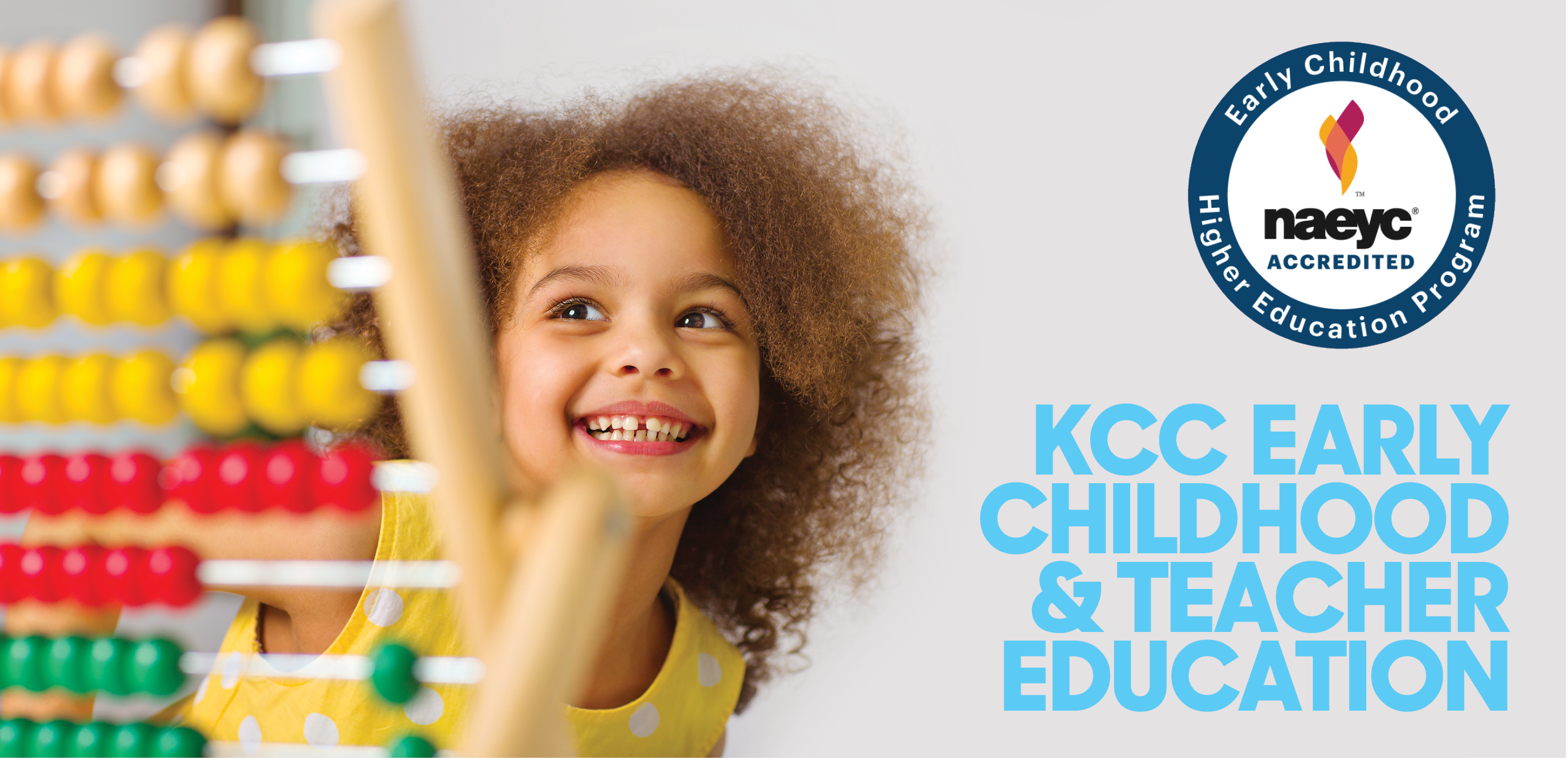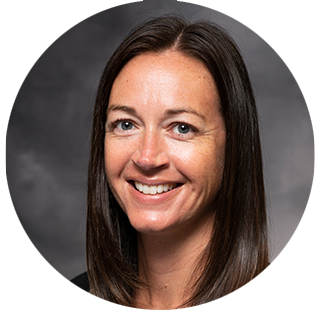
EARLY CHILDHOOD EDUCATION
& TEACHER EDUCATION
Kellogg Community College offers an Associate of Applied Science degree in Early Childhood Education, an Associate of Elementary Education and training for students interested in careers in secondary education. KCC provides supportive programming that can help you become a great teacher. We know from experience the work you do as an educator will deeply impact the quality of people’s lives for many years to come! Click through the links below for information about specific Education programming.
Your content goes here. Edit or remove this text inline or in the module Content settings. You can also style every aspect of this content in the module Design settings and even apply custom CSS to this text in the module Advanced settings.
Accreditation
The Associate in Applied Science in Early Childhood Education at Kellogg Community College is accredited by the Commission on the Accreditation of Early Childhood Higher Education Programs of the National Association for the Education of Young Children. The current accreditation term runs from March 2021 through March 2028.
NAEYC Outcome Measure 1 - Percentage of Program Completers
| Academic Year | Number of Program Completers | Percentage of Program Completers Attending Full-Time at Time of Completion | Percentage of Program Completers Attending Part-Time at Time of Completion |
Percentage of Program Completers Not Enrolled* at Time of Completion |
|---|---|---|---|---|
| FA/20-SU/21 | 25 | 8% | 68% | 24% |
| FA/19-SU/20 | 28 | 14.29% | 64.29% | 21.42% |
| FA/18-SU/19 | 31 | 9.68% | 48.39% | 41.93% |
*Kellogg Community College does not require students to be currently enrolled in a given semester when they apply to graduate with an associate degree or certificate. These students are program/certificate completers and noted as "Not Enrolled".
NAEYC Outcome Measure 2 - Program Completion Rate
|
Academic Year in Which a Fall Cohort of Full-time Candidates Enrolled in the Program |
Percentage of Those Candidates Who Completed the Program Within 150% of Published Timeframe* |
Percentage of Those Candidates Who Completed the Program within 300% of Published Timeframe |
|---|---|---|
| FA/15-SU/16 | 1.00% | 2.00% |
| FA/14-SU/15 | 1.00% | 1.00% |
| FA/13-SU/14 | 0% | 0% |
*The Associate in Applied Science in Early Childhood Education degree can be obtained within two years, spanning four semesters.
NAEYC Outcome Measure 3 - Fall-to-Fall Retention Rate
| Academic Year |
Percent of Part-Time Candidates Enrolled in the Program |
Retention Rate Among Part-Time Candidates |
Percent of Full-Time Candidates Enrolled in the Program |
Retention Rate Among Full-Time Candidates |
|---|---|---|---|---|
| FA/20-FA/21 | 76.85% | 40.96% | 21.15% | 32.00% |
| FA/19-FA/20 | 76.47% | 25.64% | 23.53% | 41.67% |
| FA/18-FA/19 | 83.44% | 40.48% | 16.56% | 40.00% |
Mission
KCC's Early Childhood Education Program's mission is to prepare candidates:
- with the knowledge, practices and attitudes necessary to support young children’s healthy growth and development;
- to conduct themselves as early childhood professionals implementing ethical decision making and self-reflection;
- to lead and advocate for quality early childhood programming among their peers and in their communities;
- to recognize best practices and quality standards;
- to serve as a resource in the communities we serve; and
- to respect diverse families and to support each child.
Conceptual Framework
What do we value as a professional early childhood program? The ECE Program believes:
- Building positive relationships is an essential task and a foundational component of early childhood education.
- Curriculum should incorporate teaching modalities that focus on practice, reflection and research-based active learning experiences.
- Diversity is respected through equitable learning opportunities for all candidates to ensure each person’s strengths, cultural background, languages, abilities and experiences are valued.
- Candidates must have opportunity for hands-on experience and application to develop the knowledge, skills and professional dispositions required of all early childhood education professionals.
- Community engagement is crucial to ensuring positive, long-lasting residual effects amongst outcomes and overall effectiveness.
Flexible Classes & Hands-On Experience
Most of KCC’s Early Childhood Education courses are offered in the evening or online to meet the needs of nontraditional students, allowing students more flexibility in their class schedule. Additionally, students may take many ECE classes on campuses in Barry, Branch and Calhoun counties. KCC’s ECE students are diverse and busy, and KCC strives to provide courses that allow students convenience without limiting quality.
Every Early Childhood Education student at KCC student receives individualized advising. KCC’s ECE courses are hands-on and meaningful, and are taught by instructors who have up-to-date skills and knowledge, as many are actively working in the ECE field. Additional training opportunities including Child Development Associate (CDA) training and ECE internships.
Career Pathway Maps
- Associate in Elementary Education
- Associate of Applied Science in Early Childhood Education
- Associate of Applied Science in Early Childhood Education – ONLINE
Transfer Pathway Maps
Can’t find a specific pathway map? Contact Academic Advising for assistance in customizing pathways based on your individual educational goals.
EARLY CHILDHOOD EDUCATION
Early childhood education is a fascinating and dynamic field that focuses on children’s growth and development between the ages of birth and age 8. KCC’s ECE Program trains students to meet the state of Michigan’s Child Care Licensing Regulations for child care providers, federal mandates for Head Start teaching staff and the Michigan Department of Education Great Start Readiness training guidelines for preschool paraprofessionals. Full and part-time programs are available.
KCC offers an Associate in Applied Science degree in Early Childhood Education as well as Child Development Associate (CDA) training. For more information about KCC’s Early Childhood Education Program, see:
- Associate of Applied Science in Early Childhood Education
- Associate of Applied Science in Early Childhood Education – ONLINE
- Early Childhood Education (ECE) course descriptions
- Early Childhood Education Brochure
- Early Childhood Education Program Information Guidelines
- Early Childhood Education Central Abuse and Neglect FAQs
- Early Childhood Education Internships
ELEMENTARY & SECONDARY EDUCATION
Public school teachers must have at least a bachelor’s degree, complete an approved teacher education program and be licensed by the state of Michigan. KCC’s Elementary and Secondary Education Program has partnered with several bachelor’s-degree granting institutions to facilitate a smooth transition for students. At the community college level, students interested in earning a bachelor’s degree in either elementary or secondary education should follow the transfer guide for the institution they intend to enter at the junior class level.
KCC offers a two-year Associate of Elementary Education degree for students focused on elementary education and an Associate in Arts degree for students focused on secondary education.
Associate of Elementary Education
KCC’s Associate of Elementary Education students earn approximately half the credits toward a four-year bachelor’s degree at KCC and complete the remaining courses required through a university. Elementary Education students at KCC follow a clearly defined degree path by following an articulation guide tailored to each student’s bachelor’s-degree granting institution of choice.
Associate in Arts Degree
For students with a focus on secondary education, there are many benefits to earning an Associate in Arts degree on the way to completing a bachelor’s degree. Benefits include more job opportunities, increased income earning potential and the opportunity to work in an education setting to gain valuable experience while completing training requirements to become a state-licensed teacher.

CDA TRAINING
The Child Development Associate (CDA) is a credential awarded by the Council for Professional Recognition. A CDA credential recognizes skills of early childhood caregivers and education professionals. It is designed for individuals who have work experience in child care settings.
KCC provides classes for academic credit which may be used toward the completion of CDA. These classes may also be applied toward the completion of an Associate in Applied Science degree in Early Childhood Education.
The Benefits of CDA Credential
- Advance your career
- Meet job requirements
- Reinforce your commitment to early childhood education
- Provide parents with peace of mind
- Understand developmentally appropriate practice
- Increase your confidence
- Meet licensing requirements
Individuals interested in starting CDA training at KCC should contact KCC’s Early Childhood and Teacher Education Office at 269-565-2109 to arrange an appointment with a program advisor. The advisor will guide each student individually prior to registration.
Prospective CDA trainees should also contact the Council for Professional Recognition at 800-424-4310 to request a direct assessment packet before beginning their training.
Advising & Transfer
View transfer guides outlining opportunities for students looking to transfer their KCC credits to a four-year institution. Contact Academic Advising at 269-965-4124 or advising@kellogg.edu to schedule an appointment to plot a personal transfer plan or contact KCC’s Early Childhood and Teacher Education Department at 269-565-2109.
APPLY NOW
New students must log in to the application system using a Facebook or Google account.


Current or returning students should log in using their K-ID.

Arts, Communication
& English
Business & Computer
Information Technology
Early Childhood
& Teacher Education
Health Sciences
Manufacturing, Skilled Trades &
Applied Technology
Science, Mathematics & Engineering
Social Science, Human Services & Criminal Justice
Transfer Studies




